STATEHOUSE REPORT | ISSUE 22.19 | May 12, 2023
NEWS: Budget, abortion drive order for special legislative session
NEWS BRIEFS: Measure would bolster EV charging infrastructure
LOWCOUNTRY, Ariail: Government handouts
COMMENTARY, Brack: Perfect time to open International African American Museum
SPOTLIGHT: SC Clips
FEEDBACK: Send us your thoughts
MYSTERY PHOTO: Interesting sculpture
Budget, abortion drive order for special session
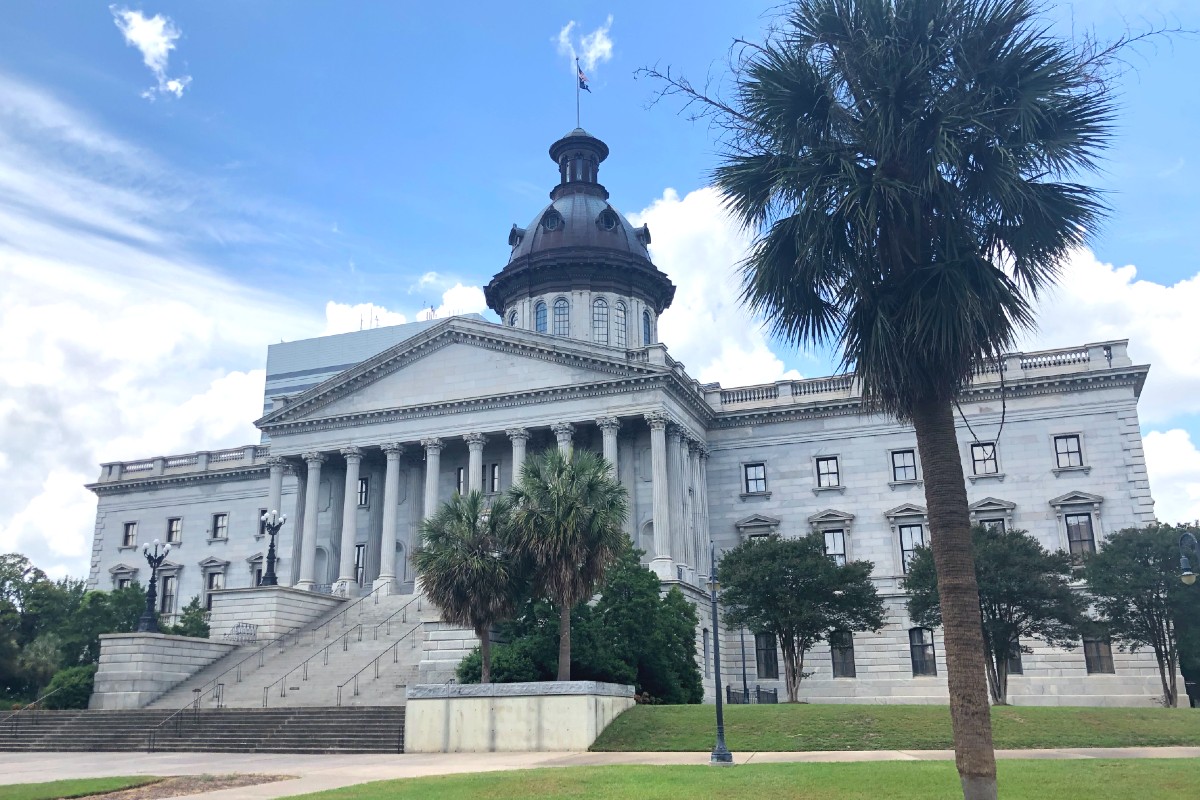
By Andy Brack, editor and publisher | South Carolina’s legislators, who went out of session Thursday without a finished budget for 2023-24, will return Tuesday for a special unlimited session after an executive order signed today by Gov. Henry McMaster.
The governor used the power of calling lawmakers back into session for the first time in about 20 years. McMaster said in a statement this morning that legislators did not finish their business.
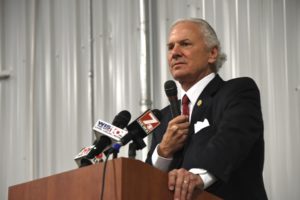
“The General Assembly did not close the revolving door for criminals. It remains wide open,” he said. “They have not passed bond reform, and they have not enhanced the criminal penalties for illegal-gun possession. In addition, the General Assembly must complete the state budget, and they must pass legislation that stops our state from becoming a destination for abortions.”
It’s the last word of the quote that is the driver of what’s happening at the Statehouse.
In most years, lawmakers pass a “sine die” resolution to allow them to continue to meet for limited time and purposes – generally to deal with differences between the House and Senate budgets.
But this year, hard-right House lawmakers roiled plans for a Thursday end of the legislative year by again pushing for approval of abortion legislation that’s tougher than current law, which allows South Carolina women to consider abortion or other reproductive health choices up to 22 weeks after conception.
What that means is the House and Senate will continue to meet until they decide to stop meeting. They could eventually adjourn. Or like in some past years when they feuded with governors, they could just recess and come back anytime before the end of the year.
In other words, they don’t have to go out of session once they pass a budget or abortion legislation or anything from proposals on bond reform or hate crimes or education feeding programs. It could be an endless summer and fall of lawmaking.
One Statehouse insider likened what happened with today’s executive order to a baseball game. Games are supposed to end after nine innings. But if there’s a tie at the end of nine, then it could go 13 or 17 or 27 innings until someone wins. In terms of the legislature, that means it could stay in session until House or Senate Republicans want to stop meeting.
Basically because the House and Senate couldn’t agree on when to end the session since Republicans took control of both chambers in 2001, they subtly transferred power to the governor.
“It puts the governor in the game,” one observer said, noting that although McMaster couldn’t require lawmakers to talk about one issue or another, he had increased power to influence the legislative agenda.
Abortion debate fueled special session
The special session was made necessary after hard-right House legislators pushed their pet issue of division – abortion, which, in turn, clogged progress on the state budget. And without a state budget by June 30, state government could grind to a halt.
Last week, Statehouse Report was first to explain how anti-abortion lawmakers in the House, who have been pounding the legislative process since last year for a near-total abortion ban, were desperate to get something done tougher on abortion this year. Coincidentally, McMaster also wants tougher abortion laws to fulfill political promises made for years.
Over the weekend, they caved to a six-week ban passed earlier this year by the Senate. That measure, Senate Bill 474, passed out of a House committee this week, but didn’t make it across the finish line. If it passes the House, it will return to the Senate for further consideration. But changes could sour senators and leave everything up in the air.

Planned Parenthood’s Vicki Ringer called the special session extreme and said it would waste taxpayer money.
“Lawmakers are obsessed with controlling the decisions and bodies of women in this state while ignoring soaring rates of maternal and infant mortality and economic insecurity,” she said. “People are just trying to put food on the table, care for their families and live the life they want for themselves.
“We’re tired of the culture wars, and we certainly don’t want politicians interfering with our health care or telling doctors what to do. Legislators need to put a stop to these political antics now.”
In January, the S.C. Supreme Court struck down a six-week abortion ban. But the proposed legislation now under consideration is even tougher, Ringer said.
HB. 474’s six-week ban is more onerous than the abortion ban struck down by the S.C. Supreme Court in January, according to Planned Parenthood. Under the pending bill, women would only be allowed to obtain an abortion past the earliest stages of pregnancy under narrow circumstances, including
- Serious risk of substantial, irreversible impairment of a major bodily function to the pregnant person, or if performed to prevent their death;
- Diagnosis of a fatal fetal anomaly; or
- Certain cases of sexual assault only up to the 12th week of pregnancy and only if the doctor reports the assault to the sheriff in the county where the abortion is provided, potentially against the wishes of the patient.
- Have a comment? Send to feedback@statehousereport.com
Measure would bolster EV charging infrastructure
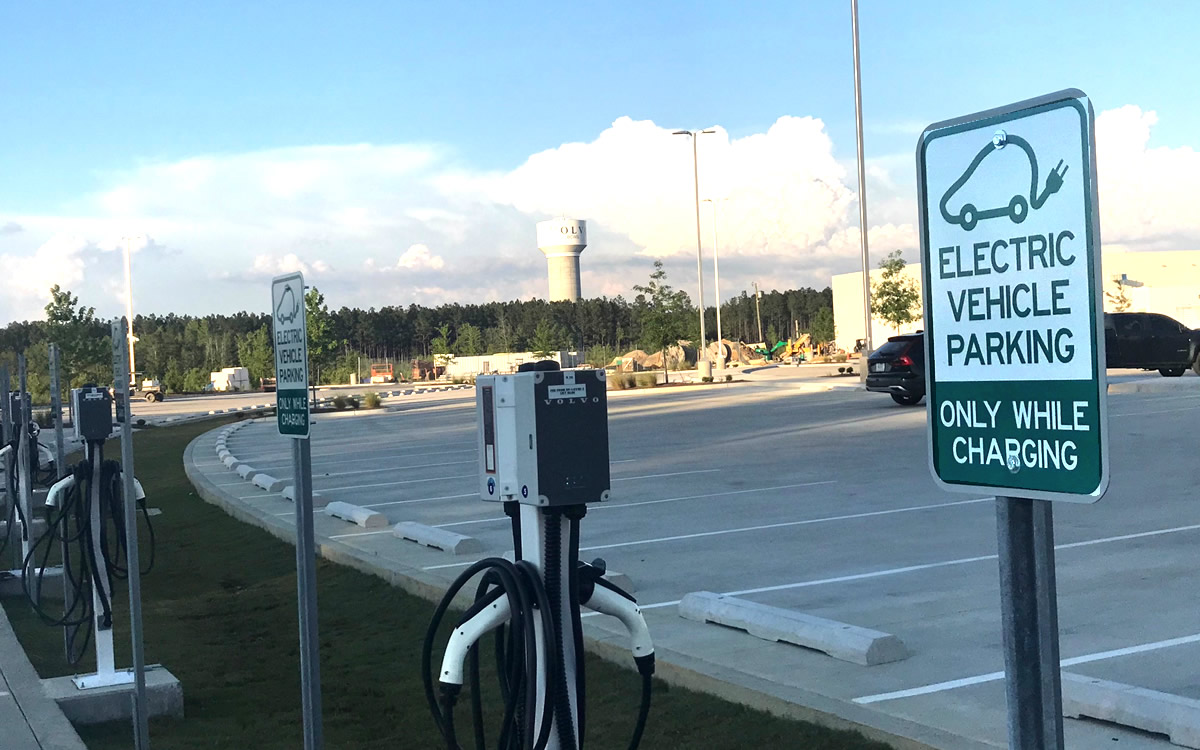
Staff reports | The S.C. House voted 92-16 Wednesday to pass an alternative fuel tax credit to cover costs for more charging infrastructure for electric vehicles (EV). The measure, House Bill 3824, now is in the Senate Finance Committee.
Current state law limits the tax credit to economic development investments in natural gas and propane fueling infrastructure. By extending that credit to EV charging infrastructure, advocates say the bill would increase the rate of charging deployment and private capital investments by business and residents.
Additionally, having more EV charging infrastructure likely would lead to more EV investments and jobs because of South Carolina’s leading role in making the vehicles as well as the increasing demand for electric vehicles at home and abroad.
In other recent headlines:
![]() S.C. Republicans continue to push for teaching restrictions on race. State senators voted 27-10 this week to restrict how teachers discuss race in public school classrooms. According to South Carolina Public Radio, the measure would prevent teachers from explaining that a person “‘bears responsibility for actions committed in the past’ by other members of their race, and that someone is inherently privileged or should receive ‘adverse or favorable treatment’ due to their race.”
S.C. Republicans continue to push for teaching restrictions on race. State senators voted 27-10 this week to restrict how teachers discuss race in public school classrooms. According to South Carolina Public Radio, the measure would prevent teachers from explaining that a person “‘bears responsibility for actions committed in the past’ by other members of their race, and that someone is inherently privileged or should receive ‘adverse or favorable treatment’ due to their race.”
Lawmakers pass bill providing parental leave for teachers, school employees. A bill that would guarantee paid parental leave for public school teachers in South Carolina when they welcome a new child via birth, adoption or fostering passed through the Statehouse and will soon reach the governor’s desk to be signed into law.
S.C. Senate panel advances penalties for illegal guns. A state Senate panel approved increased penalties for the illegal possession of firearms, one of Gov. Henry McMaster’s highest priorities, by attaching two different bills — one with near universal support and the other highly controversial.
S.C. House agrees to larger state worker raises. The S.C. House voted Tuesday to increase the raises it wants to give to nearly every state employee.
Bill aiming to strengthen DUI laws passes. A new bill would temporarily impose an ignition interlock requirement on all first convictions for DUI and pre-convictions. Under current law, ignition interlock is required for convictions with a blood alcohol concentration (BAC) of 0.15, nearly twice the legal limit.
Kimpson says goodbye to state Senate. State Sen. Marlon Kimpson, D-Charleston, left a parting gift to fellow members of the Statehouse: a cardboard cutout of himself. He’s resigning to take a job on President Joe Biden’s advisory committee for trade policy and negotiations.
City Paper announces Best of Charleston 2023. The Charleston City Paper today published a massive list of more than 400 winners of its annual contest of readers’ choices of the best of Charleston — from restaurants and bars to shops, services, personalities and more. Check out the issue today. Click the image in the story to open the full winners’ lists and descriptions.
Turtle crossing
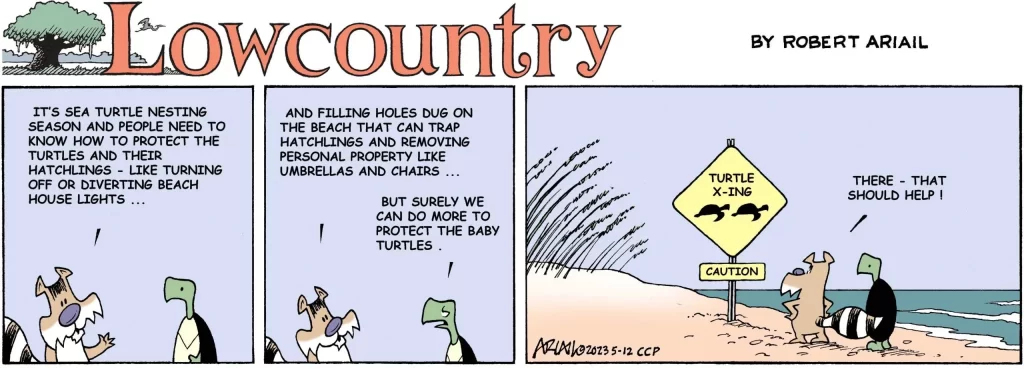
Cartoonist Robert Arial, always creative and entertaining, offers this take. Think turtles can read? Love the cartoon? Hate it? What do you think: feedback@statehousereport.com.
Perfect time to open Intl. African American Museum
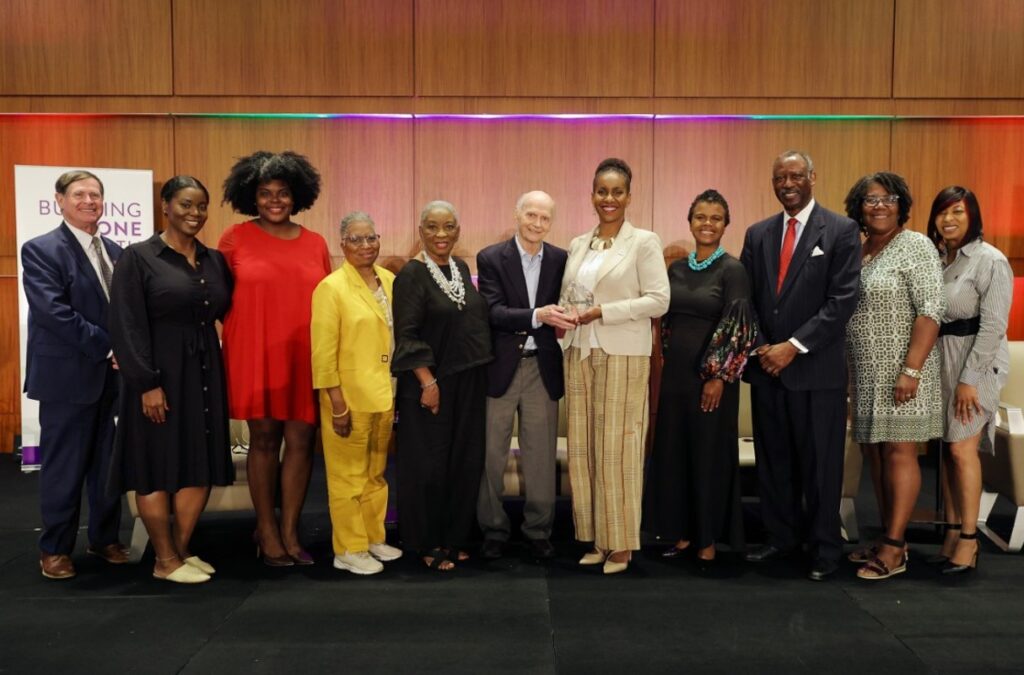
By Andy Brack | Now is the right time for the opening of an international museum dedicated to telling generations of stories stemming from the lives of enslaved Africans brutally brought to what became the United States.
And Charleston, where two of every five of the enslaved disembarked from cruel slaving ships that fueled chattel slavery, is the right place for it to be built.
Those two messages rang loud and clear May 10 when the Riley Institute at Furman University presented its second annual OneSouthCarolina Partners in Progress Award to the International African American Museum (IAAM) in a Columbia ceremony. The museum, fueled by $150 million in donations from individual, corporate, foundation, government and other institutional sources, will have a long-awaited opening June 27 after 23 years of hard work.
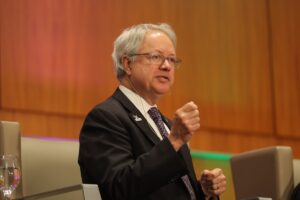
“This museum is needed now more than ever,” Charleston Mayor John Tecklenburg said passionately during a panel discussion, adding it would fill in the gaps to tell fuller stories to help explain ongoing disparities in American society caused by increasing denial, conflict and rancor. “I can’t believe the discussions going on in the school boards in our country,” he added, referring to divisive issues from book banning to so-called critical race theory that pull people apart.
“It’s a remarkable treasure for this state and our nation that we’re about to open.”
Not only will it connect White, tan, brown, Black and other Americans to richer looks at the history and culture that shaped the country, but its genealogical center will be a hub for connecting descendants of enslaved Africans to their family pasts. The museum will help to fill voids ignored by history books and allow many Americans to reclaim their family histories.
The museum, perched on the Cooper River, is combining its current transformative cultural mission with physical reminders through its location as a former slaving wharf.
“The site is powerful. It’s sacred,” Tecklenburg said. “This is one of the best buildings built in the city of Charleston in 353 years.”
Dr. Tonya Matthews, president and CEO of the IAAM, said the museum will be a site of pilgrimage where people can learn about their history. And for many, it will become transformative, personally.

“We’re providing the means for folks to unearth their own stories,” Matthews said during a panel discussion. Later she added, “We bring people here to learn. We are a site of journey and an end point for so many folks.”
And for Charleston and the South, which profited from slavery for generations, the IAAM will have a broader transformative role to spark discussion and better understanding of the past and present.
In a short film by SCETV at the start of the awards session, U.S. Rep. Jim Clyburn, the powerful South Carolina Democrat who served as the IAAM’s first board chairman, put the museum’s impact in perspective.
“This museum brings with it value,” he said. “It means that South Carolina is paying homage to the diversity of its citizens and that South Carolina is not running away from its history – that South Carolina is being true in our pursuit for a more perfect union.”
The development of the museum, which stemmed from an initiative by former Charleston Mayor Joseph P. Riley Jr., got a major boost after the devastating, sobering murders of nine worshippers at Emanuel AME Church in Charleston in 2015.
Current IAAM Chairman Wilbur Johnson reflected: “Out of some tragedies can come some good. That event catalyzed the feeling about what are we doing, what do we need to be going forward. As a result of that event, people began asking us what can we do to help. [They] recognized that the museum could be a central focus in dealing with some of the ills that were revealed with Mother Emanuel.”
The museum will be open 10 a.m. to 5 p.m. Tuesdays through Sundays starting June 27. Opening day tickets are sold out. More: IAAMuseum.org/
Andy Brack, recognized in 2022 as the best columnist in South Carolina, is editor and publisher of Statehouse Report and the Charleston City Paper. Have a comment? Send to: feedback@charlestoncitypaper.com. (If you didn’t figure it out, the song was “For what it’s worth,” by Buffalo Springfield, 1966.)
SC Clips
 Statehouse Report is brought to you weekly at no cost thanks to our underwriters. In the spotlight today is SC Clips, an affordable, daily information digest that provides you with the South Carolina news you need every business day. Subscribers receive a daily email news round-up before 10 a.m. that provides a link to each day’s edition of SC Clips.
Statehouse Report is brought to you weekly at no cost thanks to our underwriters. In the spotlight today is SC Clips, an affordable, daily information digest that provides you with the South Carolina news you need every business day. Subscribers receive a daily email news round-up before 10 a.m. that provides a link to each day’s edition of SC Clips.
Each issue (click for sample) provides a concise summary of dozens of the latest newspaper and television reports of news with statewide impact, politics, business and local stories. Readers also are linked to key opinions by South Carolina’s editorial writers.
- Learn more about this great news service that will save you time — which saves you money.
- Get a trial run at no cost.
Send us your thoughts
We encourage you to send in your thoughts about policy and politics impacting South Carolina. We’ve gotten some letters in the last few weeks – some positive, others nasty. We print non-defamatory comments, but unless you provide your contact information – name and hometown, plus a phone number used only by us for verification – we can’t publish your thoughts.
Have a comment? Send your letters or comments to: feedback@statehousereport.com. Make sure to provide your contact details (name, hometown and phone number for verification. Letters are limited to 150 words.
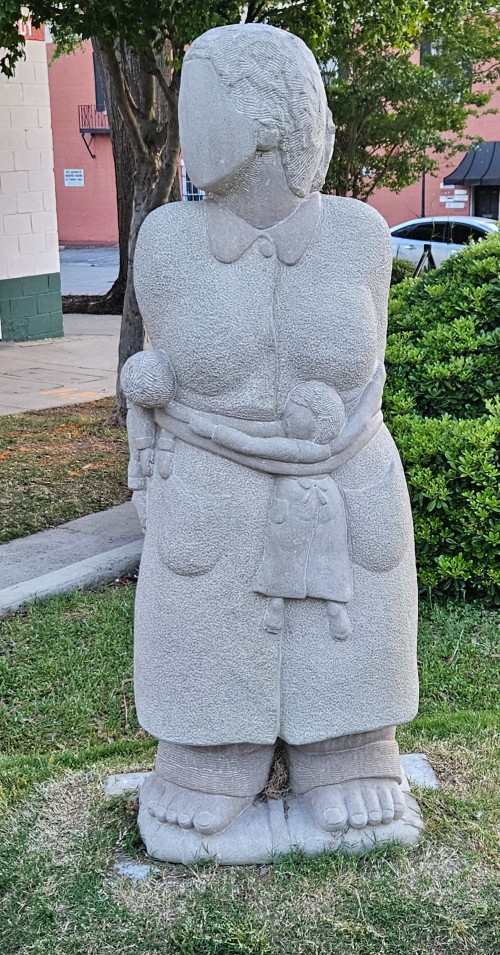
Interesting sculpture
A reader sent in this photo (right) of an interesting piece of sculpture that’s located somewhere in South Carolina. What is it and where is it? Send us your guess – as well as your name and hometown – to feedback@statehousereport.com.
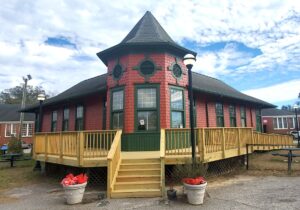 Last week’s photo – “Distinctive building”at left – showed the restored, historic train station in Blackville. It was sent in by reader Randy Herald of Lexington. He told us more: “The stationmaster was located at the corner of the building because there were supposedly E-W and N-S rail lines crossing there, one being the old Charleston to Hamburg line, once the longest train track in the world. From his perch he could observe both lines at the same time. The depot was relocated after the train lines left and is now the Blackville library.”
Last week’s photo – “Distinctive building”at left – showed the restored, historic train station in Blackville. It was sent in by reader Randy Herald of Lexington. He told us more: “The stationmaster was located at the corner of the building because there were supposedly E-W and N-S rail lines crossing there, one being the old Charleston to Hamburg line, once the longest train track in the world. From his perch he could observe both lines at the same time. The depot was relocated after the train lines left and is now the Blackville library.”
Spotter Jay Altman of Columbia shared that the depot, built in the early 1900s, was restored in 2005. It’s now a public library. Others who correctly identified it were: Penny Forrester of Tallahassee, Fla.; Karen Ingram and Elizabeth Jones, both of Columbia; George Graf of Palmyra, Va.; Jacie Godfrey of Florence, S.C.; Allan Peel of San Antonio, Texas; David Lupo of Mount Pleasant; Pat Keadle of Wagener; Bill Segars of Hartsville; Frank Bouknight of Summerville; and three others who didn’t identify themselves.
>> Send us a mystery picture. If you have a photo that you believe will stump readers, send it along (but make sure to tell us what it is because it may stump us too!) Send to: feedback@statehousereport.com and mark it as a photo submission. Thanks.
- ORDER NOW: Copies are in Lowcountry-area bookstores now, but if you can’t swing by, you can order a copy online today.
- Now available as an e-book!
ABOUT STATEHOUSE REPORT
Statehouse Report, founded in 2001 as a weekly legislative forecast that informs readers about what is going to happen in South Carolina politics and policy, is provided to you at no charge every Friday.
- Editor and publisher: Andy Brack, 843.670.3996
Donate today
We’re proud to offer Statehouse Report for free. For more than a dozen years, we’ve been the go-to place for insightful independent policy and political news and views in the Palmetto State. And we love it as much as you do.
But now, we can use your help. If you’ve been thinking of contributing to Statehouse Report over the years, now would be a great time to contribute as we deal with the crisis. In advance, thank you.
Buy the book
Now you can get a copy of editor and publisher Andy Brack’s We Can Do Better, South Carolina! ($14.99) as a paperback or as a Kindle book ($7.99). . The book of essays offers incisive commentaries by editor and publisher Andy Brack on the American South, the common good, vexing problems for the Palmetto State and interesting South Carolina leaders.
More
- Mailing address: Send inquiries by mail to: P.O. Box 21942, Charleston, SC 29413
- Subscriptions are free: Click to subscribe.
- We hope you’ll keep receiving the great news and information from Statehouse Report, but if you need to unsubscribe, go to the bottom of the weekly email issue and follow the instructions.
- Read our sister publication: Charleston City Paper (every Friday in print; Every day online)
- © 2023, Statehouse Report, a publication of City Paper Publishing, LLC. All rights reserved.


